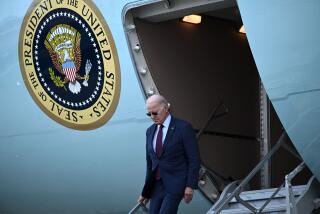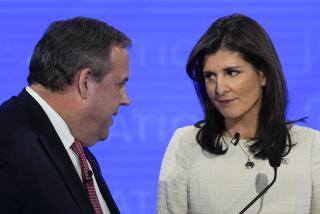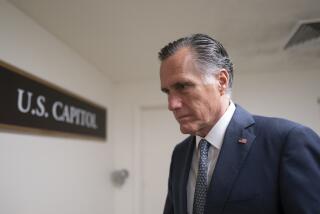Mitt Romney makes smooth shift to center in debate with Obama
WASHINGTON — The small group of voters who remain undecided or at least open to persuasion in the presidential campaign consistently tell pollsters that they want to hear specifics and don’t like partisan attacks. President Obama and Mitt Romney, his Republican challenger, obliged them.
Their debate often wandered far into the byways of Washington policy, including financial regulation, “qualified mortgages” and competing healthcare plans. Obama left aside much of the central thrust of his campaign — the fierce attacks on Romney’s business record, personal taxes and ideology.
All that played to Romney’s advantage, as the challenger rebutted some of Obama’s most persistent campaign attacks. He insisted repeatedly, for example, that he had not proposed a “$5-trillion tax cut”; said that he would continue to guarantee health coverage for people with preexisting medical conditions, even while repealing Obama’s healthcare law; and advocated regulation of Wall Street banks.
“Regulation is essential,” he said, in language that voters might have expected to hear from the president. “You can’t have a free market work if you don’t have regulation.”
Each of those comments represented a shift to the center for a candidate who had veered to the right to fend off challengers in his party’s primaries.
In some cases, Romney’s statements were open to challenge. His health plan, as described by campaign aides, protects only people with preexisting conditions who have continuously had health insurance — a right already protected by federal law in most cases. But Obama, whose own aides admit he can often be long-winded, appeared to struggle to make those distinctions clear.
The president succeeded in making some clear points, saying, for example, that under his health plan, “insurance companies can’t jerk you around.” More often, however, his answers seemed unfocused.
Romney, by contrast, was able to use the debate to begin to address the two biggest hurdles that he has faced, according to polls: Many voters say he lacks an understanding of their problems, and a significant number feel he has not offered enough specifics on his campaign plans.
Romney sought to address the issue of empathy with some of his first words, talking about “meeting people across the country” who have told him of their problems.
“I was in Dayton, Ohio, and a woman grabbed my arm, and she said, ‘I’ve been out of work since May. Can you help me?’ Ann yesterday was at a rally in Denver, and a woman came up to her with a baby in her arms and said, ‘Ann, my husband has had four jobs in three years, part-time jobs. He’s lost his most recent job, and we’ve now just lost our home. Can you help us?’”
“The answer is yes,” he said, “we can help, but it’s going to take a different path.”
The comments followed the same approach as an ad Romney’s campaign has recently aired in which he speaks directly to voters, saying that “too many Americans are struggling” and that while he and Obama both care about the poor, the difference is that his own policies “will make things better.”
But while Romney appeared to have the better outing, he also faced the harder task.
Obama has held a small but stubborn lead in the race for weeks, both nationally, according to every major public poll, and in some key battleground states, particularly Ohio and Wisconsin.
Romney trailed Obama by a couple of points in mid-August, before the two parties’ conventions. In the aftermath of the conventions, that deficit widened to 5 or 6 points. The most recent polling suggests that Obama’s edge may have started to fade.
With relatively few voters open to changing their minds about the candidates, it’s not clear whether a better debate performance will allow Romney to begin to make up that ground.
Obama was able to use the debate to make some points of importance to groups that have helped fuel his rise, particularly Latinos and blue-collar women.
Since mid-August, Obama has gone from about 60% support among Latinos to 66% in Gallup’s polling. More significantly, the share of Latinos who say they are “certain” to vote has risen from 61% to 71%, narrowing the gap with other racial and ethnic groups.
A large Latino turnout in his favor remains key for Obama’s hopes of winning several battleground states, particularly Nevada, Florida and Colorado. If his lead holds in Ohio and Wisconsin, carrying any one of those states would be enough for victory.
Wednesday’s debate did not touch on the issue of immigration, which has been a major source of strength for Obama with Latino voters. But the discussion did focus extensively on healthcare, which has also been an important subject for Latino voters, particularly women, as well as to older voters, who have been a major focus of both campaigns.
Predictably, both candidates brought up the $716 billion in Medicare cost cuts that Obama made as part of his healthcare law. Perhaps surprisingly, it was Obama who raised the issue first, seeking to frame it to his advantage. Under the law, the government was “able to save” that amount of money “by no longer overpaying insurance companies, by making sure that we weren’t overpaying providers,” Obama said.
By contrast, he said, Romney and his running mate, Paul D. Ryan, would convert Medicare from an open-ended entitlement to a voucher system for people who are now 55 or younger.
That now-familiar subject will remain front and center as Romney heads off on a campaign swing to Florida on Thursday. With a successful debate performance behind him, he will carry new momentum with him.
More to Read
Get the L.A. Times Politics newsletter
Deeply reported insights into legislation, politics and policy from Sacramento, Washington and beyond. In your inbox three times per week.
You may occasionally receive promotional content from the Los Angeles Times.







